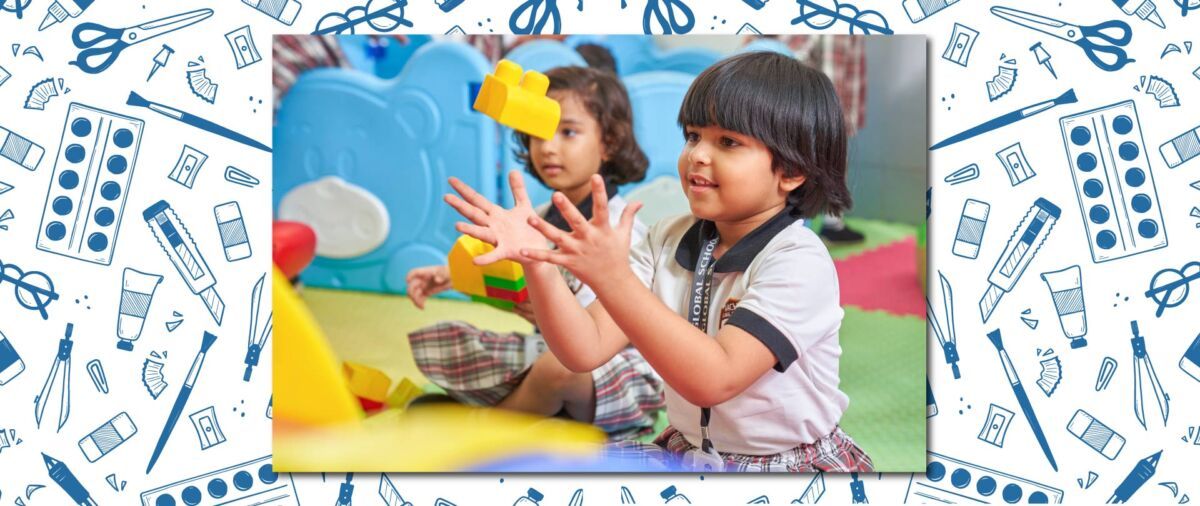It is difficult for parents to send their children to school when they are just 3-4 years old. However, giving preschool education at this age helps them succeed in all aspects of life. In preschool education, children not only get exposure to the outside environment but also develop physical coordination skills.
Preschool education gives importance to early care and childhood development, which equips your little one to learn life-important skills such as social and emotional skills. Children develop effective communication, empathy, and self-regulation when we give them opportunities to interact with others. These skills are vital for their social interactions and future success.
Keeping the above things in mind, Aachi Global School offers a diverse curriculum, experienced staff and interactive teaching methods to nurture the overall development of preschool children.
In this blog, we will delve into the importance of preschool education, its benefits, and why it is the stepping stone to your child’s future.
Admissions for 2025-26 are now open at AGS Anna Nagar and Ayanambakkam. Enrol today!
What is Preschool Education?
Before digging deep into the importance of preschool education, let's find out what is the definition of preschool. Preschools are like kindergarten for young children who attend pre-primary classes. The preschool age in India is between 1.5 to 3 years and are enrolled in early childhood programs.
Preschools have qualified teachers who help your children learn at their own pace, and focus on play-based education. This is different from the regular daycares as it focuses more on the holistic learning of your child.
What Does Research Say About the Importance of Preschool Education?
Research has signified the importance of preschool education in the child's development. The first five years of a child's life are crucial for brain development. During this time, the brain undergoes rapid growth, with more than 90% of its development occurring in these early years. Preschool education plays a vital role in providing the appropriate environment and stimulating activities that support and nurture this crucial stage of brain development.
Studies highlight that children benefit more from preschool education, showing improved social skills, reduced need for special education, better academic performance, and enhanced concentration.
Ready to make the right choice for your child's education? Explore our comprehensive guide on how to choose the best school for your child in India.
10 Reasons Why Preschool Education is Important?
Early childhood education is a part of future-generation learning as it creates a better environment for your child. The curriculum involves a lot of classroom activities, fun learning, and much more. Here are 10 reasons that show why preschool education is important.
1. Preschool Fosters Creativity and Curiosity
It is no secret that children are curious to ask questions when they are exposed to the outside environment. This is a crucial part of early childhood development as they learn about the environment and develop problem-solving skills. Activities like music, dance, art, and craft develop creativity and curiosity in their childhood.
2. Develop Social Skills and Emotional Development
The development of social and emotional skills during early childhood plays a crucial role in shaping the child's behaviour to navigate relationships and interact with society. They learn by watching, listening, and responding to the social behaviour of others. Nurturing and responsive care foster healthy social and emotional development during their childhood.
3. Preschool Teaches Language and Communication Skills
Language and communication skills are vital to early childhood development. Children learn and develop their communication skills through play-based learning and creating rich-language-based environments. Preschool education can help children develop communication skills by asking them questions during classroom activities and introducing new vocabulary and other activities.
4. Preschool Develops Cognitive Skills
The preschool education curriculum involves participation in activities that encourage children to try new things, learn by playing games, ask questions, and observe the environment around them. These skills not only benefit them inside the classroom but are also useful when they interact with others outside.
5. Pre Literacy Skills
Preschool education offers kids to play a variety of games and fun activities to teach pre-literacy skills. Rhymes help the children to discriminate between sounds. Stories improve your kid's memory and develop comprehension skills. Teaching them words, and numbers helps them to improve their language and maths skills.
6. Preschool Promotes Self Confidence
Confidence and self-esteem play a crucial role in helping children to face the environment bravely. In preschool education, teachers instil confidence in children by asking them to wash their hands after using the washroom, keep their belongings in bags, put the toys in designated places, etc.
7. Develop Motor Skills
Early childhood education develops motor skills that are crucial as they serve as the foundation for your children's overall physical interactions and behavioural development. Engaging in activities such as playing with balls of varying sizes, jumping rope, running at different speeds, pedalling riding toys, pushing strollers or brooms, filling and emptying buckets, and climbing in different directions helps enhance gross motor skills.
8. Preschool Teaches Decision Making
Preschool education provides a safe and structured environment for children to make decisions and make choices independently. They conduct age-appropriate games to find the age, weigh options, and make decisions. This will help them to improve their analytical and critical thinking skills.
9. Preschool Teaches Children To Become Independent
Preschool education encourages children to show their unique personalities and develop a sense of individuality. Through various engaging activities, children can make choices, and explore their interests etc. They learn to communicate, and express their thoughts and feelings, building self-confidence.
10. Preschool Prepares Children For Kindergarten
Preschool education acts as a stepping stone to face formal education in kindergarten. Activities like working on simple puzzles, organising objects into groups, matching pictures, and repeating words in rhymes help children to succeed in kindergarten education.
Role of Parents in Preschool Education
Parents can support their child’s preschool education in the following ways.
1. Communication
Keep in touch with the child’s teacher frequently to learn about their growth, talent and areas of improvement.
2. Home Extension
Parents can discuss what is being taught in the play school. You can engage with your children by discussing the day's activities, reading books related to the curriculum etc.
3. Celebrate Achievements
Celebrate your child’s achievement even if it is small. Recognise their efforts, praise their achievements and provide positive feedback.
Conclusion
We hope this blog clarifies all your doubts and helps you understand the importance of preschool education. Enrolling your child in preschool is the stepping stone to open limitless possibilities. Preschool education fosters social skills, and cognitive skills and promotes the love for learning.
At Aachi Global School, we understand the importance of preschool education which is why we focus on holistic education, a safe environment, world-class facilities and trained teachers, making it an excellent choice for your children’s preschool education.
2025-26 admissions are now open at AGS Anna Nagar and Ayanambakkam. Enrol today!
Frequently Asked Questions
1. What is the meaning of preschool education?
Preschool education is the early childhood education provided to children before they enter formal education. The preschool age in India is typically between 2-3 years.
2. Why preschool education is important?
Preschool education is important because it lays the foundation for a child’s lifelong academic journey.
3. What is the difference between preschool education and a daycare program?
Preschool education focuses on early childhood development and prepares children for kindergarten. However, daycare plays a significant role in the social and emotional development of children.




